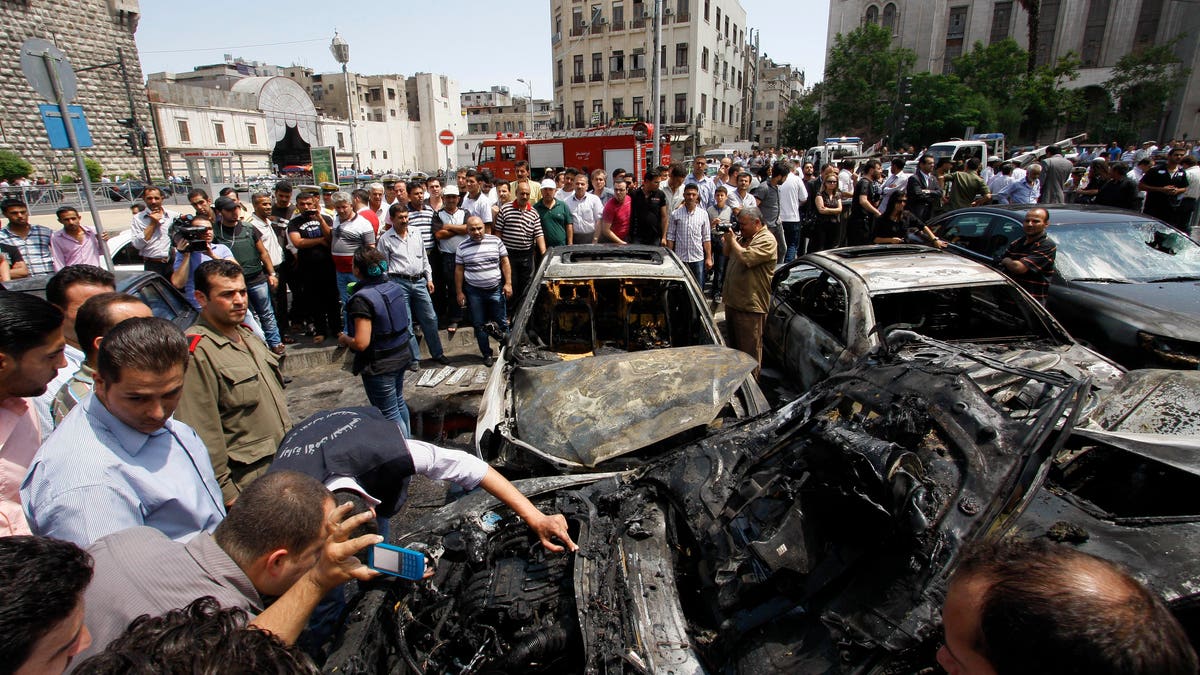
June 28, 2012: Syrians inspect burned cars at the site of a blast in the Syrian capital Damascus. (AP2012)
BEIRUT – Government troops rained tank and artillery shells down on a rebellious suburb of the Syrian capital of Damascus Friday, killing at least 43 people over two days, opposition groups and activists said.
The barrage is part of a fierce government offensive aimed at regaining control of parts of Damascus suburbs where rebels operate, particularly Douma, a sprawling suburb that has been a hotbed of dissent against President Bashar Assad's regime.
A local activist who spoke on condition of anonymity for security reasons said the shelling was "relentless" throughout Thursday, and exploding shells killed people in their homes.
The Britain-based Syrian Observatory for Human Rights said 41 people died in all-day shelling of Douma Thursday, including three children and five members of a single family. At least two more were killed Friday morning.
"They (government troops) are trying to bring Douma under control, but they are being met by fierce resistance," said Rami Abdul-Rahman, the group's director. He said most of the dead were civilians.
The Local Coordination Committees network said 59 people were killed in Thursday's shelling of Damascus suburbs, most of them in Douma. The difference in tolls illustrated the difficulty of verifying information coming out of tightly controlled Syria, where journalists and human rights groups are either banned or severely restricted.
Amateur videos posted by activists online showed bloodied bodies lying on blankets in a room and others shrouded in white sheets and placed on stretchers. "A new massacre by Bashar Assad," cried a man holding a dead girl in a pink blouse, a large gash on her face.
The violence around the capital's suburbs mirrored fighting across many parts of Syria that killed dozens of other people Thursday, according to the groups.
Activists say more than 14,000 people have been killed since the uprising began in March 2011.
Much of the violence that has gripped Syria has been sanctioned by the government to crush dissent. But rebel fighters are launching increasingly deadly attacks on regime targets, and several huge suicide bombings this year suggest al-Qaida or other extremists are joining the battle. A bomb blast rocked central Damascus on Thursday near a busy market and the country's main justice complex, wounding at least three people and sending a cloud of black smoke into the air.
The latest carnage came as world powers show new urgency to resolve the crisis, which so far has resisted international efforts.
World powers will meet Saturday in Geneva for talks on Syria, but few observers expect a breakthrough. Syria has the protection of Russia, a veto-wielding member of the U.N. Security Council, and has so far been impervious to international pressure.
Russian Foreign Minister Sergey Lavrov said Moscow will not endorse a call on Assad to give up power.
"We are not supporting and will not support any external meddling," he said. "External players must not dictate ... to Syrians, but, first of all, must commit to influencing all the sides in Syria to stop the violence."
U.S. Secretary of State Hillary Rodham Clinton said Thursday it was "very clear" that all the participants at the Geneva meeting -- including Russia -- are on board with a transition plan created by international envoy Kofi Annan. His plan calls for the formation of a national unity government that would oversee the drafting of a new constitution and elections.
Clinton told reporters that the invitations to Saturday's meeting in Geneva made clear that representatives "were coming on the basis of (Annan's) transition plan."
Lavrov said it was "obvious that a transitional period is needed to overcome the Syrian crisis," but insisted the major powers in Geneva must focus on convincing the opposition groups to soften their demands.
Diplomatic hopes have rested on Russia to agree to a plan that would end the Assad family dynasty, which has ruled Syria for more than four decades. Russia is Syria's most important ally, protector and supplier of arms.
There are few options besides keeping up diplomatic pressure, as an international military intervention is all but ruled out in the near future. Few countries are willing to get deeply involved in such an explosive conflict, and Russia and China have pledged to veto any international attempt to intervene militarily.








































